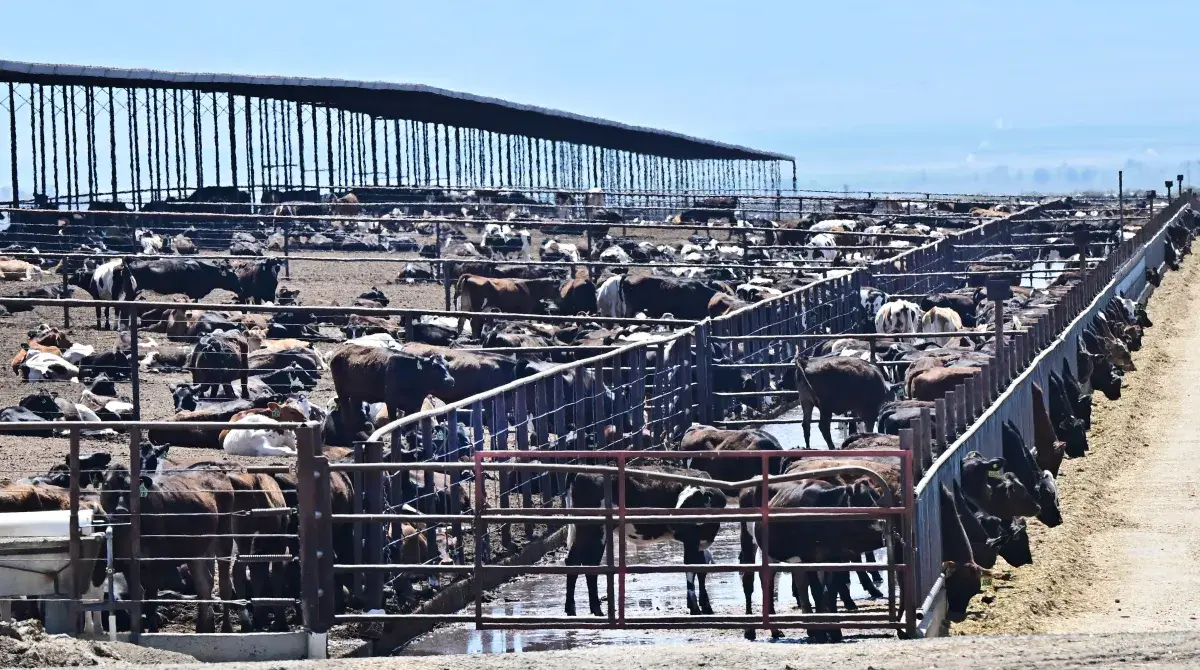Copyright Newsweek

Cattle farmers have urged lawmakers to support legislation aimed at reducing the risk of wildfires. On Tuesday, the Senate Agriculture, Nutrition and Forestry Committee voted 19-5 to advance the Fix Our Forests Act, which would overhaul forest management and reduce legal and environmental checks on forest-thinning projects. The National Cattlemen’s Beef Association (NCBA) has urged lawmakers to pass the legislation to better mitigate the “widespread risk of catastrophic wildfire.” Newsweek has contacted the White House for comment via email. Why It Matters While farmers have traditionally been among the president’s biggest supporters, members of the struggling industry have increasingly expressed frustration with the Trump administration over its trade and immigration policies. This week, cattle farmers have criticized Trump’s plan to import beef from Argentina as a way to reduce high prices for meat in the U.S. What To Know According to the bill’s text, the legislation would direct the agriculture secretary to “develop a strategy to increase opportunities to utilize livestock grazing as a wildfire risk reduction strategy.” Kaitlynn Glover, the NCBA’s executive director of natural resources and executive director of the Public Lands Council (PLC), said the federal government “must better utilize grazing to combat the wildfire crisis.” Glover said the legislation would “help to unleash the conservation prowess of ranchers by limiting frivolous litigation and streamlining government processes to reduce fuel loads on the landscape at a much faster pace.” This bipartisan group of senators introduced the legislation in April: John Curtis, a Utah Republican; John Hickenlooper, a Colorado Democrat; Tim Sheehy, a Montana Republican; and Alex Padilla, a California Democrat. In a news release at the time, the lawmakers said it would “combat catastrophic wildfire risk, improve forest management, and secure a stronger economy, safer communities, and healthier, more resilient forests.” Some environmental groups and opponents argue that the bill advances the logging industry’s priorities, limits public engagement and does little to reduce the risk of wildfires. While cattle farmers hope lawmakers will pass the legislation and President Donald Trump will sign it into law before the 2026 wildfire season, they have expressed skepticism over another recent proposal coming out of Washington. The NCBA was among the organizations that criticized Trump’s plan to import beef from Argentina, with CEO Colin Woodall saying it “only creates chaos at a critical time of the year for American cattle producers, while doing nothing to lower grocery store prices.” John Boyd, a cattle and crop farmer and the founder of the National Black Farmers Association, previously told Newsweek that he was “appalled President Trump, who campaigned on how he loved farmers, is putting America’s farmers out of business by helping Argentina farmers first.” Meanwhile, Senator Deb Fischer, a Nebraska Republican, has urged Trump to reconsider the plan, saying ranchers “cannot afford to have the rug pulled out from under them when they’re just getting ahead or simply breaking even.” Beef prices have soared to record highs as diminished cattle herds fail to match high American demand, and imports are down because of tariffs Trump imposed on exporting nations, including a 50 percent tariff on Brazil. What People Are Saying Kaitlynn Glover, NCBA executive director of natural resources and PLC executive director, said in a statement: “The established science is clear: grazing can reduce wildfire risk by up to 80 percent. Given the widespread risk of catastrophic wildfire, the federal government must better utilize grazing to combat the wildfire crisis. The Fix Our Forests Act will help to unleash the conservation prowess of ranchers by limiting frivolous litigation and streamlining government processes to reduce fuel loads on the landscape at a much faster pace. “By expediting environmental reviews and cutting government red tape that delays critical projects, this bill will increase the resiliency of our treasured national forest system at no cost to taxpayers. NCBA and PLC thank Chairman John Boozman and Ranking Member Amy Klobuchar for working to get this bill out of committee and look forward to a full floor vote.” Senator Alex Padilla said in a statement: “The status quo around wildfires isn’t working and far too many Americans have paid the price. The families I’ve met who have lost everything to the devastation in Los Angeles and in wildfire disasters across the country deserve action. That’s why we’re coming together to confront this crisis and rethink how we prevent and respond. Today’s advancement of our bipartisan bill is real progress toward protecting Americans and our environment through forward-thinking, practical wildfire solutions.” Senator Tim Sheehy said: “Better stewardship of our forests is not a partisan issue; it’s an imperative to securing a stronger economy, healthier forests, and safer communities. I’m proud to see the bipartisan Fix Our Forests Act move forward in the legislative process, and I’ll continue fighting alongside my colleagues to enact commonsense reforms that ensure proper forest management, unleash the resource economy, and protect American communities from the threat of wildfire.” Senator Michael Bennet, one of five Democrats who voted against advancing the bill, said in a statement: “Many Coloradans have voiced serious concerns that the current version of the Fix Our Forests Act eliminates opportunities for public and Tribal participation, and dramatically limits the ability of communities to ensure those projects follow the law. I share those concerns. Tribes and local communities are crucial partners for forestry projects in Colorado, and their early engagement in project development often accelerates projects, rather than slows them down. As I have said from Day 1, their voices must be included in this process. “To fully address the wildfire crisis in the West, Congress must also prioritize the on-the-ground staff and fully fund the Forest Service. Since January, the Trump administration has taken a chainsaw to the Forest Service workforce, making life harder for Coloradans and gateway communities across the West. The Fix Our Forests Act provides no resources to implement any wildfire risk reduction projects nor does it restore land management agency staff.” Sam Evans, the forest program leader at the Southern Environmental Law Center, said in a statement: “The Forest Service is way off the rails. It’s essential that Congress assert itself to rein the agency in. Instead, this bill would give it a longer leash and block the public’s path to hold them accountable through the courts. “The so-called Fix Our Forests Act claims to prevent wildfires, but in reality it just makes it easier for the Forest Service to continue exploiting our least fire-prone forests for timber production, including those in the Southeast.” What Happens Next The House passed a version of the bill in January. The Senate version has cleared the committee stage, but given the ongoing government shutdown, it is not clear when a vote in the Senate would be held.



